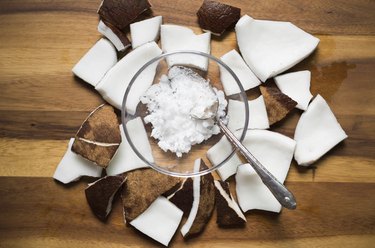
If you're looking to keep your pie crusts flakey and your cookies rich in flavor without using butter, coconut oil is a great substitute in the kitchen! This ingredient can be effectively substituted into many of your favorite recipes without dramatically affecting the taste of the foods you love.
Follow the tips below to swap coconut oil for butter the next time you're cooking or baking.
Video of the Day
Video of the Day
Coconut Oil as a Substitute
A 1:1 butter to coconut oil ratio can be used in most recipes, according to MDhealth.com. This means that if the recipe calls for 1/3 cup of butter, you should use the same amount of coconut oil. Keep in mind that coconut oil does have higher percentage of fat solids, according to Harvard School of Public Health, and that butter has a slightly higher water content than coconut oil.
If you notice some of your recipes are a little less moist when you use this substitute, you can overcome this dryness by adding slightly more of any liquid the recipe calls for. You can also use refined coconut oil as a butter substitute if you don't want a strong coconut flavor.
Cooking With Coconut Oil
If you're baking with coconut oil instead of butter, it's best to use recipes that specifically call for the oil. In addition to having a slightly higher water content, butter has a different melting point. This can affect the overall taste and texture of foods slightly when butter and coconut oil are interchanged.
If you're using coconut oil as a butter substitute to saute or prepare a stir fry, remember it has a slightly lower smoke point than other refined oils. Unrefined coconut oils start to smoke at 350 degrees Fahrenheit, according to The Institute for Functional Medicine.
Finally, it's best to cook with unrefined, extra virgin coconut oil. While refined oils may be more accessible and cheaper in the store, the refinement process often uses bleach and other chemicals. This can affect the overall taste of the oil and the consistency of the foods you are preparing. It also may rid the coconut oil of many of the nutrients that make it such a valuable substitute for butter.
Know the Benefits
While both coconut oil and butter contain high amounts of saturated fats, coconut oil contains several beneficial ingredients that make it a slightly healthier alternative. One of the main saturated fats found in coconut oil is called lauric acid. This substance contains high amounts of HDL, the beneficial form of cholesterol that may help cancel out harmful LDL cholesterol and minimize the risk of developing heart disease.
Coconut oil may also help you burn more calories and maintain a healthy weight. This is because it contains substances called medium chain triglycerides or MCT. According to a February 2017 article published by Practical Gastroenterology, MCTs are purported to increase energy expenditure, reduce body weight and overall total body fat.
Finally, people with food allergies may find coconut oil particularly appealing. The oil is dairy free, making it safe for lactose intolerant individuals. Coconut oil is also free from soybean oil, an ingredient in other common butter substitutes like vegetable oil and margarine that has been linked to weight gain and diabetes, according to the American Association for the Advancement of Science.
Consider Other Uses
Whether it's time for breakfast, lunch or dinner, there are many other great ways to incorporate coconut oil into your diet. For a quick and delicious breakfast, try spreading room temperature coconut oil on toast and sprinkling with cinnamon.
Melted coconut oil can also be combined with your favorite seasonings and drizzled over chicken, pork or fish. Finally, try combining it with vinegar, honey and salt to create a delicious dressing for your salad.
- Harvard School of Public Health: "Coconut Oil"
- MDhealth.com: "Why and How to Use Coconut Oil to Replace Butter?"
- American Association for the Advancement of Science: "Soybean Oil Causes More Obesity Than Coconut Oil and Fructose"
- Practical Gastroenterology: "The Use of Medium-Chain Triglycerides in Gastrointestinal Disorders"
- The Institute for Functional Medicine: "A Guide to Cooking with Fats and Oils"